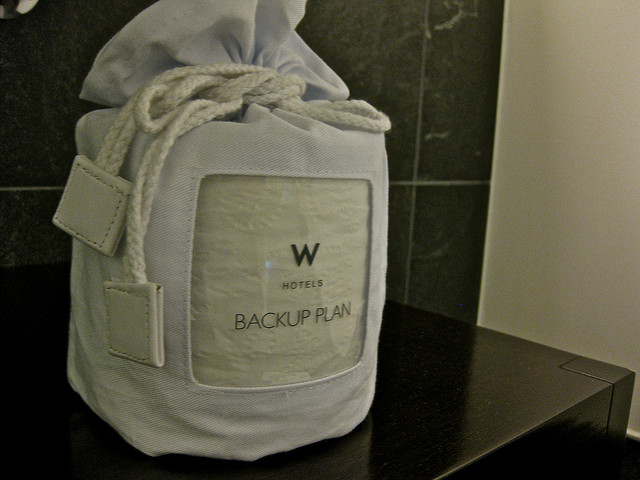
Following on from The Disillusionment of the Early Career Engineer, I could write a number of different things, but the thing that I find people having the biggest trouble with, that I am continually nudging people on, is the finding of other options and opportunities.
I don’t know why. Do people view this as disloyal? There’s a big difference between having one foot out the door and knowing you have other options. Feeling trapped, I maintain, is not loyalty.
Meanwhile, the process of having options looks a lot like having a good network. This is actually really helpful, even if you stay put. Knowing what other people are up to can help you get ideas, and contacts, and help other people – those who haven’t yet mastered the art of the plan B.
- Broaden your network, be part of a club. There are the people you work with day to day, but other people that you can artificially create some kind of connection with. Taken a personal development course? Connect with someone or a group you were part of, afterwards. Catch up with the people you did your induction with periodically. For me, I find the groups of women I’m involved with invaluable for broadening my network.
- Take an interest. Talk to people about what they are doing, why it’s interesting, what the biggest problems they have are.
- Offer information. Don’t assume they must know already, an email that says, “Hey I thought of our conversation last week when I saw this <link>. Wonder what you thought about <point from article>. Anyway, hope you’re doing well.” is at best useful, and at worst shows you are thoughtful and that you remember them.
- Say thank-you. I think it’s easy to assume that someone knows they did a great job, or that everyone really appreciated the course they ran, or whatever. But no-one tires of hearing they helped.
- Send a complement. Similar to saying thankyou, send a brief note when you see someone recognised for something, or get promoted – “Saw your recent promotion! Well deserved, very happy for you” takes seconds to write. I’m pretty sure a email correspondence I have with a senior person comes from me regularly saying thank-you and complementing them on great stuff that they do. Try complementing speakers for talks that you genuinely love. Everyone gets nervous when they speak in public!
- Have an abundance mentality. If there’s an opportunity but you’re not keen to move right now, or it’s not the right next move for you, recommend someone else instead. It shows that you’re connected, and helpful. Even if 6 months later it turns out you want it, it wasn’t going to be there anyway. If the timing is wrong, there’s no saving for later.
- Stay in touch. New opportunities come from people you’ve worked with. Catch up for lunch periodically, or send an email from time to time if they are further away.
- Ask for others. Hiring manager to someone looking for their next opportunity. Someone needing a mentor, with someone who has a similar background. Women especially I hear complaining that they don’t have a mentor, for example, but I think we could fix that for each other, if we tried.
- Be a go to person for something. This broadens your reach. I’ve met a surprising number of people as the designated repository for depressing statistics. But I also have a lot of experience on mobile, with a depth on iOS, and people ask me for help there, too. If I can help someone, I do.
- Reply to recruiters. Possibly controversial, but I maintain a polite “I”m happy where I am right now” or “I’m not actively looking, but I’m happy to chat” is not a bad thing. It’s a reminder that you have options, and keeps things warm. They’ll probably email again in 6-12 months, and maybe then you will be looking. It’s easier if you are sought after – I doubt I’ll put my resume through an automated screening process ever again.
When
The answer to this is – always. Always always always be creating opportunities and options. But sometimes it is more pressing than others.
- You don’t remember when you last learnt something.
- You can’t think of anything you (your team) achieved lately that you are proud of (or, at all). A sign of your own disconnection, or that there is Trouble ahead.
- You notice time more than you used to.
- One morning a week you always seem to get up later… and it’s a day with a meeting you dread.
- You imagine yelling at whoever seems to be the cause of your misery.
- You are out of empathy for people causing you stress (they are no longer humans, they are problems you are forced to interact with every day).
- You leave work frustrated and internally (or externally) ranting, every day.
- People seem to be asking you if you’re OK a lot.
- Your unhappiness if affecting important relationships.
- You leave the office in tears, regularly.
- You find yourself realising that 15 minutes has gone by, and you’ve just been staring at the wall (you can replace “wall” with “bathroom door”.
- You can’t come up with realistic action steps to improve your situation.
- You can’t imagine a successful outcome to what is currently your #1 problem.
This is a good article on toxic jobs.

2 replies on “10 Ways to Develop Your Plan B”
10 Ways to Help Develop Your Plan B http://t.co/KfZAJmFJ2G
[…] 10 Ways to Develop Your Plan B […]